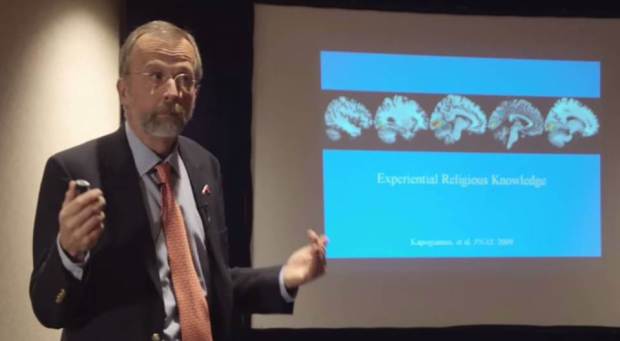Dan Barker hosts Freethought Radio solo again this week as Annie Laurie is taking care of her ailing mother. We hear that Justice Scalia believes the human species to be 5,000 years old, that Jesus welcomes visitors to a Texas town and about a widespread delusion that Christianity is under ruthless attack by the liberal world. Dan talks with Michigan activists Holly Huber and Mitch Kahle, who are fighting religious incursions into government, especially the public schools. After Freethought Radio, we learn from Gordon Bonnet that Western tourists who took their clothes off on the summit of Mount Kinabalu on Borneo caused not only scandal, but, according to some, an earthquake. Of course over here in America, we’re far too advanced to believe that gods send down natural disasters to punish sinners…or are we? Then, how close are we to understanding the psychological mechanisms that generate religious beliefs? Why do so many religions include beliefs in a counterintuitive world, but one which is only a little counterintuitive? What is the real function of religious ritual? Do we need a group selection hypothesis to explain religion? Psychiatrist J. Anderson Thomson discusses how recent psychological research bears on these questions and more with Alan Litchfield, host of the Malcontent’s Gambit podcast. Thomson is author of Why We Believe in Gods, A concise guide to the science of faith, is a staff psychiatrist at the University of Virginia Student Health Services and faculty at the Institute of Law, Psychiatry and Public Policy at the University of Virginia.
[audio http://dl.dropbox.com/s/l49bp2pm1t7vv0q/SkepSun_06_14_2015.mp3]psychology
SkepSun #115 (11_30_2014)
On this week’s Skeptical Sunday we consider how difficult it is to truly ‘know thyself.’ We tend to be terrible at assessing our own skills and expertise. In fact, the less expertise we have at a task, the less we’re able to realize how badly we’re doing at it. This is called the Dunning-Kruger Effect. It’s also been called the “American Idol Effect” for the contestants who get eliminated in the early rounds of that TV show who are completely convinced they are gifted vocalists, yet sing terribly. In the words of the Cornell Professor of Psychology for whom the effect is named “If you’re incompetent, you can’t know you’re incompetent. […] the skills you need to produce a right answer are exactly the skills you need to recognize what a right answer is.” David McRaney on the You Are Not So Smart podcast interviews Cornell Professor David Dunning and they discuss the research that shows how we often misjudge and miscalculate our own abilities and those of others. But first, on Freethought Radio, FFRF attorney Andrew Seidel relates news about a victory stopping a bible class in Mustang, Oklahoma public schools that was to be sponsored by the president of Hobby Lobby. Then Annie Laurie Gaylor and Dan Barker talk with author and researcher Roy Sablosky about his recent article in Social Science Journal entitled “Does Religion Foster Generosity?” A super-interesting show coming your way, keep it tuned right here.

First Century Memento Mori mosaic from excavations in the convent of San Gregorio, Via Appia, Rome, Italy. The Greek motto gnōthi sauton (know thyself, nosce te ipsum) combines with the image to convey the famous warning: Respice post te; hominem te esse memento; memento mori. (Look behind; remember that you are mortal; remember death.) (From Wikipedia.)
SkepSun #65 (11_17_2013)
On Freethought Radio, after hearing about an FFRF billboard in Janesville, Wisconsin that says “Enjoy Life Now: There is no afterlife,” hosts Dan Barker and Annie Laurie Gaylor dissect the oral arguments heard in the Supreme Court “Greece vs. Galloway” case dealing with prayer at the Greece, NY, city council. Then they talk with a legal legend, Nebraska Senator Ernie Chambers whose 1983 lawsuit resulted in the historic “Marsh vs. Chambers” decision by the U.S. Supreme Court. After Freethought Radio, Brian Dunning looks at five false claims about raw milk on Skeptoid. Then, in hour two, the Skeptic Rogues of the Skeptic’s Guide to the Universe interview Gerald Posner author of Case Closed: Lee Harvey Oswald and the Assassination of JFK, about the 50th anniversary of the mother of all conspiracy theories. And finally, on the newly revamped Point of Inquiry podcast, host Josh Zepps interviews physicist, author, and screenwriter Leonard Mlodinow about his most recent book Subliminal: How Your Unconscious Mind Rules Your Behavior. In this interview, Mlodinow explains how we have trouble poking holes in our own suppositions.
[audio http://dl.dropbox.com/s/823rpb028azuqxi/SkepSun_11_17_2013.mp3]Gerald Posner

